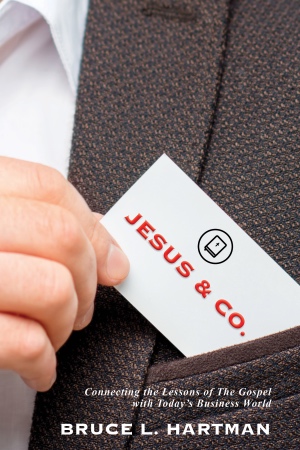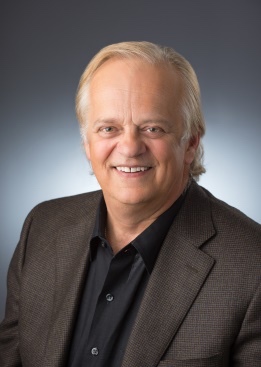
DAVID ADAMS talks to US author and former senior executive Dr Bruce L Hartman, about his new book, ‘Jesus & Co.’…
US author and former corporate high-flyer Dr Bruce L Hartman admits that it may sound odd to call Jesus Christ a “salesperson”. But, he says, the lessons businesses can glean from applying that concept to how they operate are invaluable.
Hartman, author of the recent book Jesus & Co.: Connecting the Lessons of The Gospel with Today’s Business World, says that if Jesus was a car salesman, for example, the two commandments – ‘Love Thy God’ and ‘Love Thy Neighbour’ – would inform the way He went about selling a vehicle, regardless of the profit motive.

Bruce L Hartman’s book, Jesus & Co, explores what businesses can learn from the Gospel.
“What I was trying to do was create a bridge between the church world and the business world…I find a lot of [the] time that pastors – and they’ll be fairly open about it – say that business is sinful. And business people believe that the church world doesn’t get it…”
– Bruce L Hartman
“This is a great lesson for businesses…” he says. “Besides Jesus was saying we should be good to our neighbour – and that is probably the second most important act we should do every day other than recognise the sovereign nature of God – but the [other] thing that Jesus is saying here, is that for a sustainable business, how you treat your neighbour is how you will be treated going forward…
“So there will be businesses that will take advantage of their customers and certainly we could find some that were wildly successful but over time they’re not sustainable. And I think [by] following Jesus’ sales tactics, you will have a sustainable business.”
In Jesus & Co., published in the US earlier this year, Hartman writes about his own more than 30 year career in business during which he occupied senior management positions including chief financial officer in Fortune 500 companies such as Foot Locker, Inc, and Yankee Candle and the many lessons that he learnt along the way through both times of success and times of struggle.
The 65-year-old also writes about his own call to leave the business world and study theology. He tells of how, after doing so, he started his own consultancy, Gideon Partners, a vehicle through which he aims to share what he’s learned about business, but also about Jesus, with people such as those running businesses, entrepreneurs who have a new idea to develop and the unemployed who are looking for work.
“What I was trying to do was create a bridge between the church world and the business world…” he says. “I find a lot of [the] time that pastors – and they’ll be fairly open about it – say that business is sinful. And business people believe that the church world doesn’t get it…”
Hartman says that with most people having to work at some point in their lives, not having a bridge between church and the business world can actually be “harmful to people in terms of their faith lives”.
“I really think that’s something that if I were the pastor of a church, I would be doing 50 per cent of Sundays – talking about how to manage our business lives.”
The idea to write the book goes back to 2009 when Hartman, who, along with his wife Connie, is currently living in North Carolina (the couple have four daughters and three grand-children), had a transformational experience with God that changed the path he was headed along.
“One of the problems with being successful is [that] you lose your way…you lose your humbleness,” he says. “And you start believing that everything you do that works out is because of you. So you’re not as kind to other people and you start believing that you are an idol. So, as my years went on and as I became more and more successful, it wasn’t like I was a bad person, I just didn’t have my priorities right.”
He says that while a pastor Kenny (who also happened to be his brother-in-law) had been giving him messages for some time that he “should be doing more for God”, the change came in a dramatic moment in the early hours of one Monday morning when, unable to sleep, he was out walking and came to a spot where there was a light shining on a sidewalk.
“It was at that instant that realised I no longer knew how to pray,” Hartman says, noting that this came as a shock given that, raised in a family that attended a Congregational church, he had been brought up to be “one of the good guys”.
ON JESUS, THE ARTISAN
Dr Hartman says that one of the most exciting aspects of writing the book involved exploring the idea of Jesus working as a skilled craftsman, an artisan.
Noting there are two references to Christ being a carpenter in the English-language Bible, Hartman says that when he looked back at the ancient Greek, he found the word used was ‘tekton’ which really means ‘artisan’, a word which isn’t limited to relating solely to woodworkers but which he says could also possibly mean Jesus was a stone mason.
“So we know [Jesus] was an artisan because of this Greek word – whether he was a stone mason or a great carpenter is always up for debate but I think but at least [we know] He was skilled at what He did.”
The question, Hartman says, then remains as to why Jesus worked – after all He was God and didn’t have to learn a trade.
“But I think what He did it for – as Jesus does most things – is to make Himself relatable. So when He walks into a marketplace and He says to somebody, ‘You don’t put new wine into an old wineskin’, He’s got credibility because He’s done the job. Or if He’s talking about the unfaithful employee, people understand He knows, He’s done the work, He knows that…It was a way for Him to build up his credibility.”
“At that moment I realised that I had lost everything in life that I really valued which was a relationship with God. So feeling like I couldn’t pray was really pretty devastating for me.”
While Hartman says he had still been going to church (he currently attends a Methodist church), it wasn’t high on his list of priorities and even when he did go, he says he wasn’t fully engaged. But, after his encounter on the sidewalk, led by his brother-in-law Kenny, he began the journey of returning to a revitalised relationship with God.
“From there I felt like, I had enough money – the girls’ colleges were taken care of – what was I doing? I wasn’t really helping the world, I was just taking from the world,” he recalls.
“So I decided to follow the path that I am doing now but I knew that it would require a lot of education…I really had to get the credentials and put in the time and effort to learn about Jesus and God. So that’s where I’ve been for the last eight years – I’ve just recently got my doctorate degree and I got my masters degree three years earlier.”
Hartman says that while he doesn’t feel that much different in his “own sense of being” than he had before the change, he feels “more joyous” about what he’s doing now, which alongside running Gideon Partners, sees him serving in the role of president of the board of trustees at not-for-profit organisation, A Future With Hope, which helps people affected by natural disasters in the US.
“I really love the work…” he says. “It’s like if you were a great pianist – not that I’m a great theologian – but these artists…they don’t do it for money, they do it because that’s their purpose…That’s what’s changed – I operate with a different sense of purpose and a different sense of joy than what I had in the past.”

Bruce Hartman
ON CORPORATE PHILANTHROPY
Dr Hartman says the passion for being a “good neighbour” is far greater in the business world than it was when he started working 40 years ago.
“And I see that in the corporate boardroom, I see it what corporations do and I hear about companies like Morgan Stanley requiring their employees to take two or three days a year – paid – to go out and do some good in the world.”
But as well as that, Hartman says he’s also noticed a greater sense of the need for sustainability with regard to the Earth.
“And there’s a greater recognition of equal rights for women and for all people,” he says. “So to me, I’m not cynical, I see it optimistically when I compare it to the world that I started in. It’s a much more generous corporate environment than it was in the mid-1970s.”
As well as looking at ideas such as “Jesus, the salesman”, in the book Hartman also looks at how and why so many of Christ’s words and much of His work while physically on Earth was “directed at the marketplace” and the value of team in the workplace, with a focus on the 12 disciples. He also addresses misconceptions many people have including that Christians should live in poverty (among examples of wealthy Christians who were able to use their wealth for good that he looks at in the book is Henry Parsons Crowell, founder of Quaker Oats).
One of the key themes which emerges from the book surrounds the concept of how to maintain an ethical position – following the example of Christ – despite what may sometimes be the contradictory demands of employers.
Hartman says this is a constant struggle for those in business – he recounts some examples depicting the temptations faced by them in his book – and requires ongoing vigilance.
“Two things we all have to be able to do is, number one, you’ve got to be able to walk the light and you’ve got to be able to says ‘God is going to take care of me’ and that’s what faith is…” Hartman says.
“The second thing in terms of the reality of this is when we have faith in the unseen, particularly in the business world, there will generally be a short-term loss but out of that short-term loss comes a long-term gain and it’s understanding that, that’s most important.
“So when you tell your boss, ‘I’m not doing that because it’s not the right thing to do, he or she is going to be mad at you for that moment and they may fire you – it’s unlikely, but they may fire you. But when it comes time to promote somebody in a year or two, they’re going to remember that they can trust you.
ON CORPORATE SCANDALS
Dr Hartman says he doesn’t believe that the often negative public perception of the corporate world reflects the reality.
“You’re going to have a scandal next year – you’re going to have two or three of them – and the following year you’re going to have two or three of them and so on and so forth…But you’re also going to have 400 examples of greatness by an American corporation,” he says.
Hartman says that while there is a human propensity to talk about – or, in terms of the media, report on – the scandals that occur in the corporate world – the “salacious” rather than the “greatness” , he’d love to take people through every corporate office in America and Australia to show them the “terrific people” within.
“And I tend to want to focus more on that and less on the Bernie Madoffs and the Wells Fargos…”
“So part of standing up is also part of defining who you are as person. Jesus wants us to define ourselves by our self worth, not by our net worth. And that’s how you build a sustainable career.”
Asked what advice he’d give now to someone who’s just starting out in the business world,Hartman – who has already written a second book, this time looking at the idea of developing faith, which is due to be published later this year – says simply, “Never, ever give up.”
Recalling an incident, recounted in Jesus & Co., which took place in 1999 when Foot Locker was facing bankruptcy, Hartman, who was then CFO, says he remembers having a strong sense of “just hang in there, keep this boat alive and things will turn around”.
“I had CEOs and board members getting really angry with me because I wouldn’t give in and then in a matter of 30 days, the business went, through some really unusual events, it went from almost being out of business – there was one moment when were $US87,000 away from filing bankruptcy and then at eight o’clock at night an assistant treasurer found $750,000 in a long-forgotten deposit – [and]…just took off.”
While he credits the wonderful people he worked with at Foot Locker for the turnaround, he also, for him personally, credits his belief in the “unseen”.
“So when God’s involved, never give up.”





